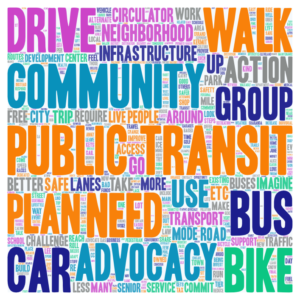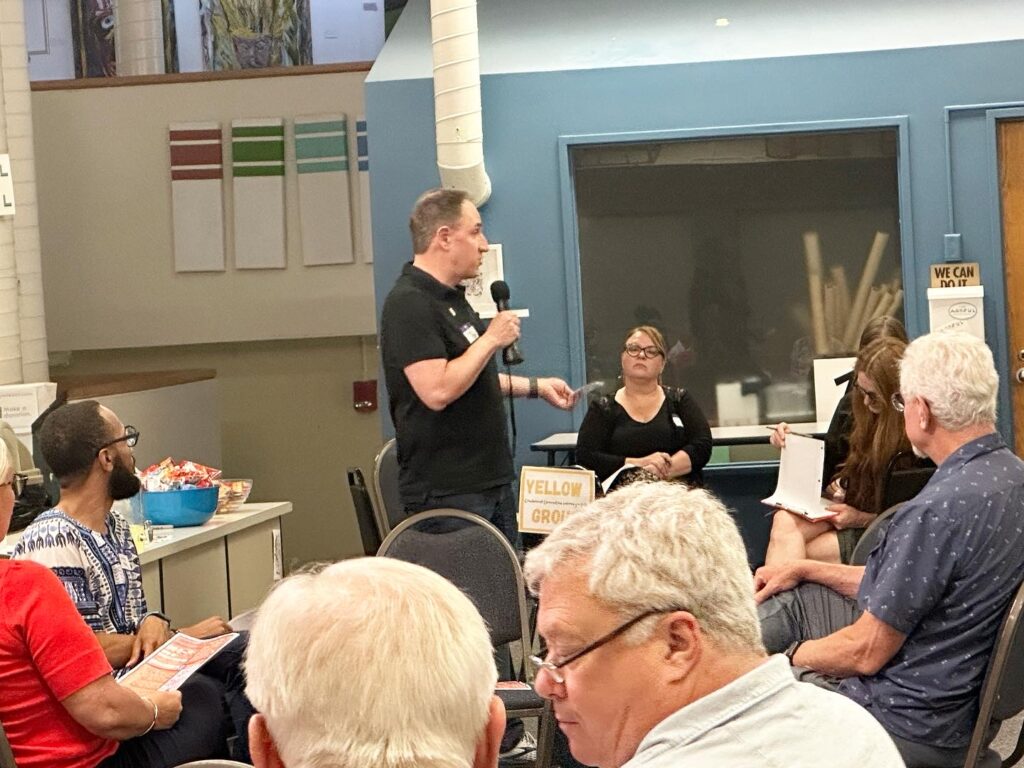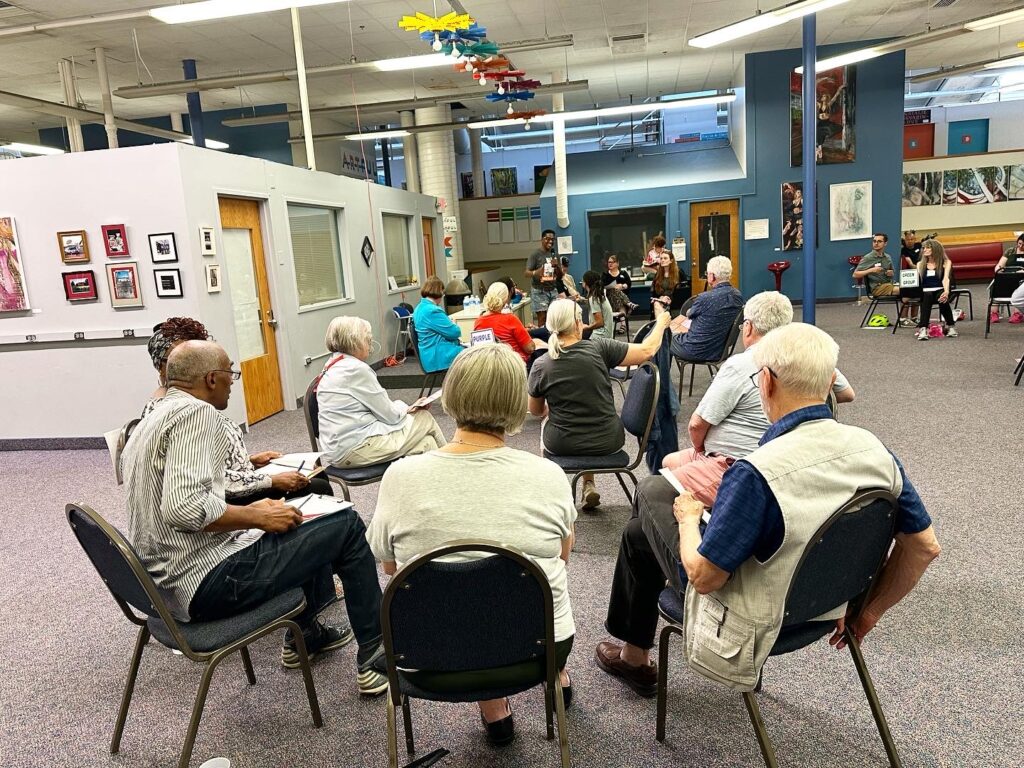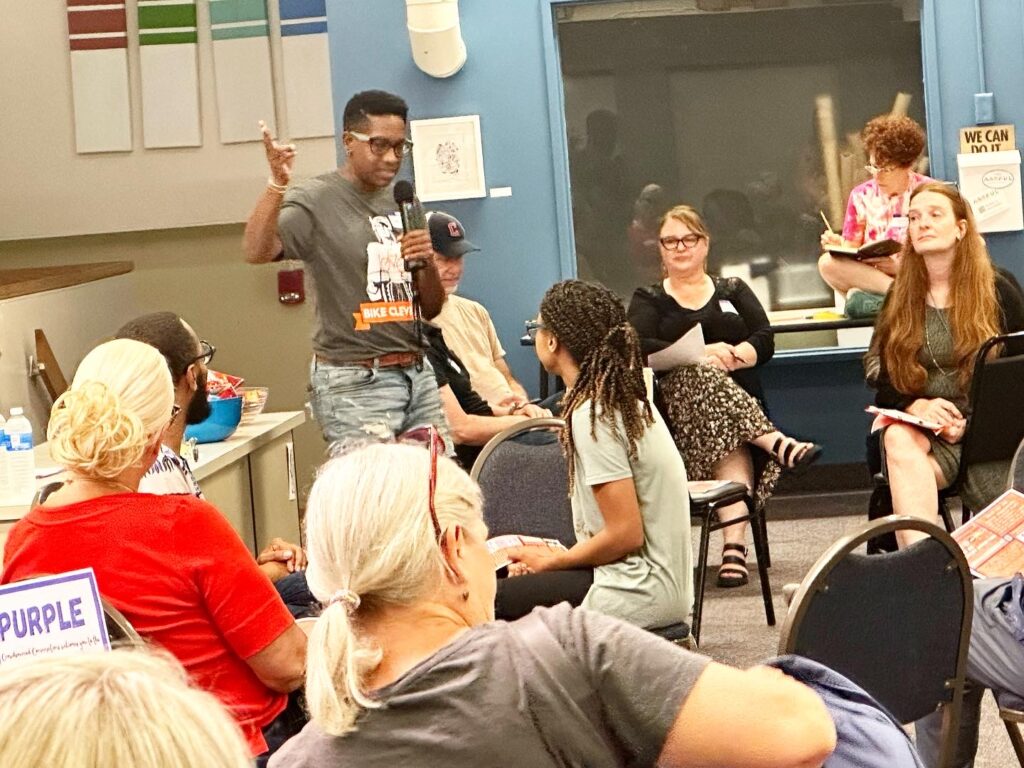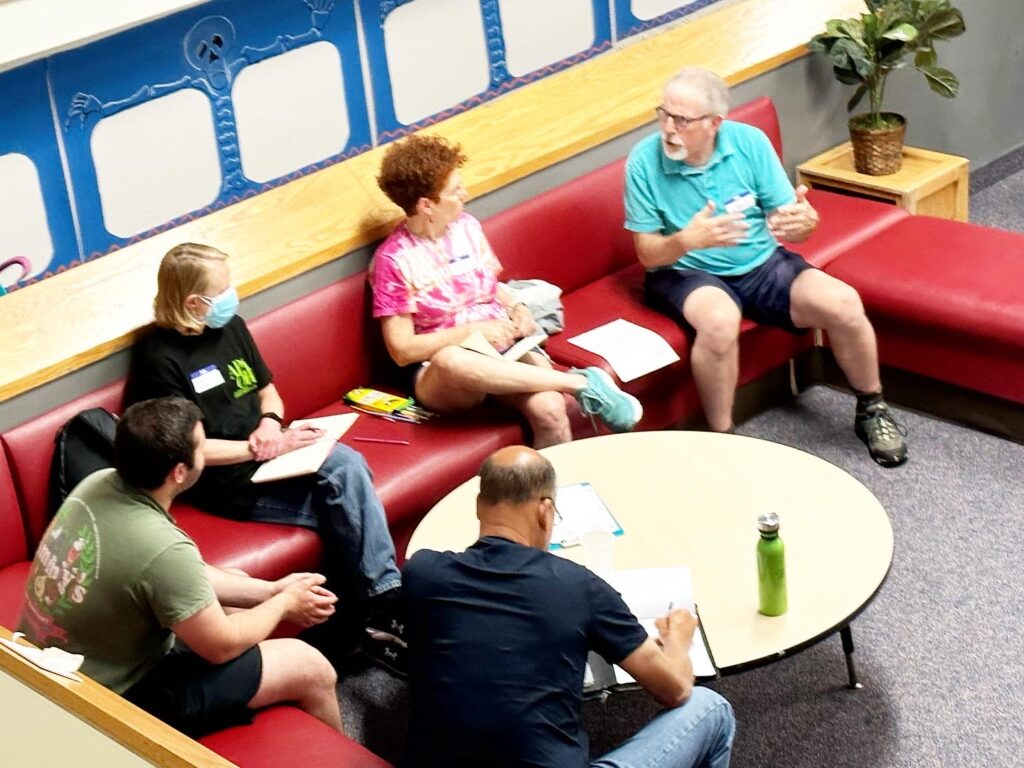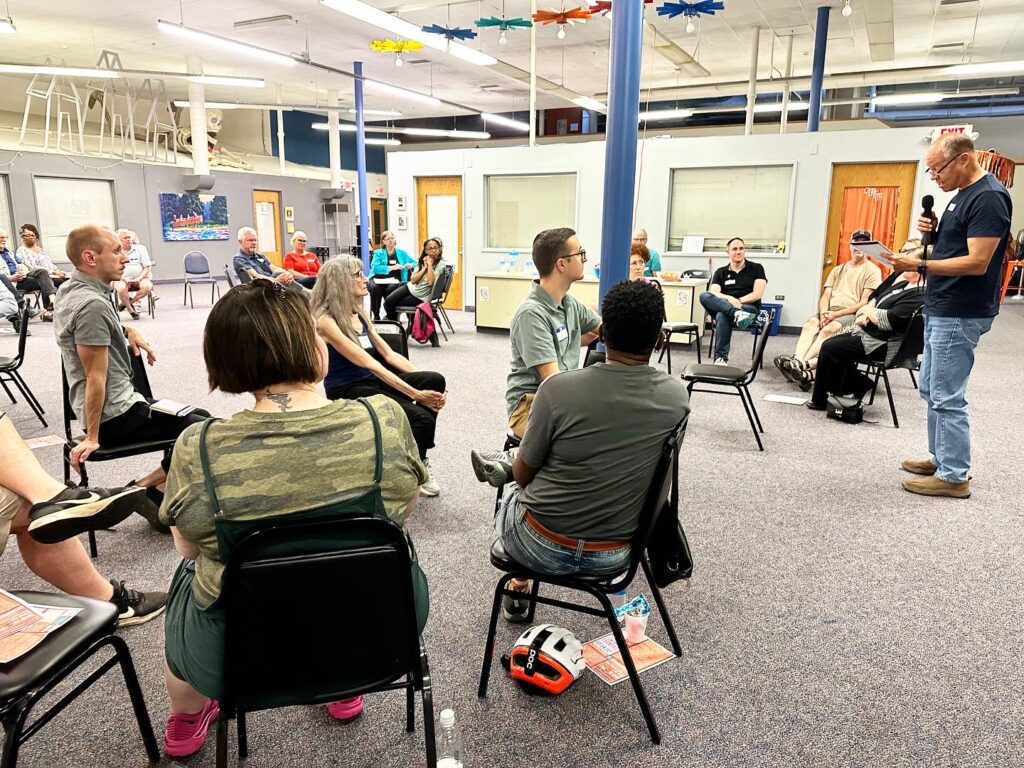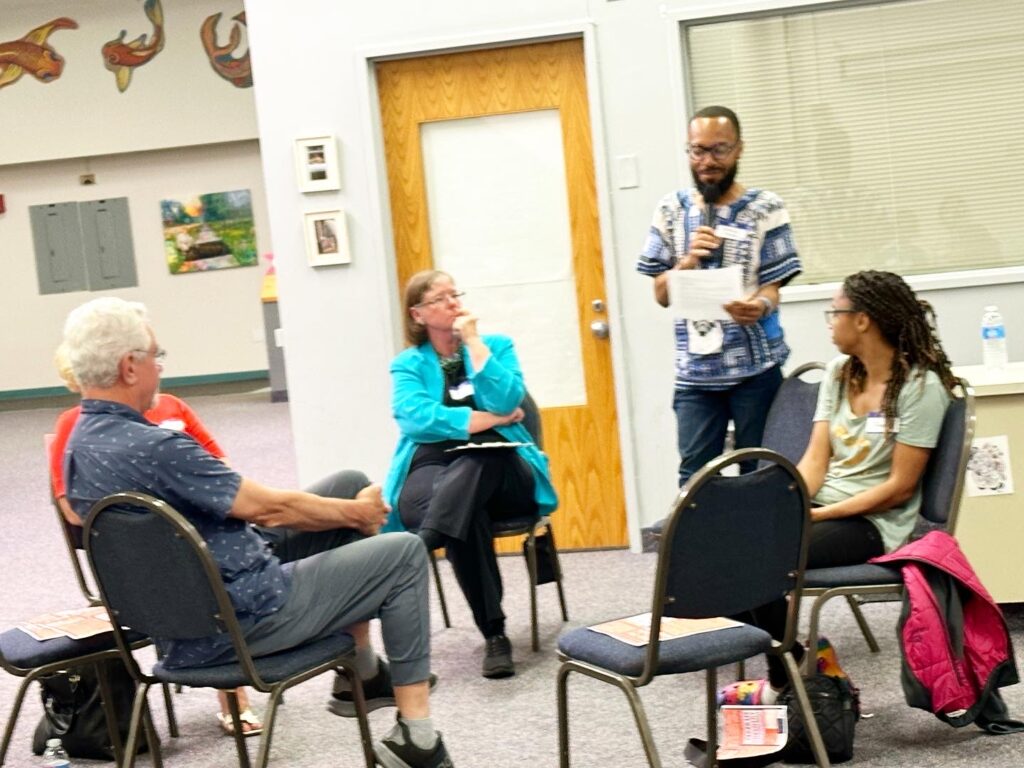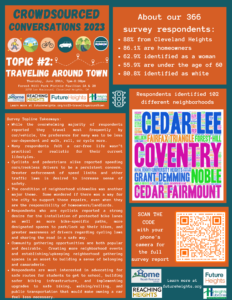WELCOME TO THE RESOURCE PAGE FOR OUR CROWDSOURCED CONVERSATION FORUM ON THE TOPIC OF TRAVELING AROUND TOWN!
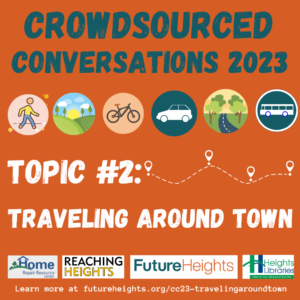 On Thursday, June 29th around 40 Heights community members gathered at Coventry PEACE to participate in our second Crowdsourced Conversations event of 2023, this one on the topic of “Traveling Around Town.” Special thanks to University Heights Councilperson Brian King and Deidre McPherson (Bike Cleveland, Heights Biking Coalition) for their opening remarks!
On Thursday, June 29th around 40 Heights community members gathered at Coventry PEACE to participate in our second Crowdsourced Conversations event of 2023, this one on the topic of “Traveling Around Town.” Special thanks to University Heights Councilperson Brian King and Deidre McPherson (Bike Cleveland, Heights Biking Coalition) for their opening remarks!
ACTION STEPS: Each group identified meaningful action steps they could take, either individually or as part of the collective. Here are some highlights from each group.
BLUE GROUP: Commit to: (1) using a bicycle instead of a car for trips less than a few miles; (2) walking instead of using a car when the destination is less than a mile; (3) shopping more locally; (4) being better organized to avoid multiple trips requiring the use of a car; (5) carpooling to get to work, socialize, run errands, etc.; (6) using public transportation to go downtown for events instead of driving; (7) being “tougher” when the weather is bad so we walk or bike instead of taking a car. Some suggested advocacy steps: (1) A use tax based upon the mileage driven; (2) An increase in the gas tax; (3) Safer sidewalks and crosswalks; (4) Better public transportation; (5) Better infrastructure for bicycling; (6) Sidewalks and bike lanes cleared of snow in the winter; (7) Advocating for our public officials to spend more money on public transportation and infrastructure for dedicated bike lanes and pass.
GREEN GROUP: Break the habit of reaching for the car keys and see what socializing or errands, etc. can be done by walking/rolling or biking. Seek out walking/rolling/biking groups to gain that social support for being less car-dependent. Share your stories with neighbors about the times you’ve walked/rolled or biked places to provide that example of how it’s possible to be less car-dependent. Advocate for better infrastructure for biking and walking/rolling to make it easier for everyone. Pose the question to your household: do we need a car or do we need two cars? What would our lives look like with one car only or no cars at all? Start the conversation and see where it leads! Consider the health and environmental benefits of walking/rolling/biking as well as the the cost of upkeep on car-focused infrastructure. It might help lower the city’s costs if more people were setting the car keys aside in favor of other methods of getting around town.
ORANGE GROUP: Advocacy to bring circulator buses into the Heights would help connect the neighborhoods and allow residents easy ways to get around town without using a car. There are also free transportation services for seniors and those with disabilities — more information about those services will be linked below in our resource list. Additionally, allowing golf cart-sized vehicles on the road or even designating certain roads to be not-for-cars would increase safety.
PINK GROUP: Look to college campuses as a model for local transportation. How do they make it easier for students not to drive to class? Some of those practices could be implemented if the Heights had a local shuttle bus/circulator. Adding more “last mile” options, like rental bikes or scooters, would help those who might feel like they live just a little too far away get to the train or to their destination without picking up the car keys. Above all, make it “frictionless” to try out less car-dependent modes of transport — in other words, make it easy for residents to get where they need to go without a car. This means thinking pedestrian-centric and cyclist-centric when strategizing about planning & development in our communities.
PURPLE GROUP: Reimagine transportation infrastructure during planning for new development projects. Organize events & other draws that encourage/require walking (walkable restaurant or historic tours, scavenger hunts. Organize “bike rodeos” & other supports for biking in the schools, thus building a culture of biking in the next generation. Implement more biking-related instruction/education so cyclists know the laws and how to keep themselves safe. Advocate for more neighborhood-centric/hyper-hyper-local retail, grocery, restaurants, etc. so residents had what they needed nearby, lessening their impulse to drive elsewhere for goods & services. Add more bike racks and other bike-friendly amenities to make cycling more desirable. Be mindful that some residents choose to walk/roll/bike for fun or exercise while others use non-car methods as their main mode of getting around. For those who rely on pedestrian, cycling, or public transportation options, city planning needs to consider non-car methods of transportation as a requirement, not a recreational frill.
RED GROUP: Talk with officials about bike/walking lanes and trails, and including way-finding for designated lanes & trails. Determine if the Planning Commission or Planning Department can require consideration of alternative modes of transit when developments come before them, or would it require legislation from the council. More projects like the Compton Greenway that include traffic calming elements. Improve promotion and communication of existing programs of free transportations services such as paratransit, Circle Link, and other programs offered by RTA, office of aging and county. Look at what other cities are doing, such as free group sharing on-demand electric vehicles.
YELLOW GROUP: Think about the neighborhood where you live and what is easy to access nearby and what isn’t currently there, causing you to have to drive. Advocate for more biking infrastructure to be included in neighborhoods — things like bike racks, bike locks, bike repair stations in addition to bike lanes. Lobby elected officials/planning to create more live/work areas. Reduce traffic and speeds in areas of large poverty — poorer neighborhoods have more car related deaths since many of the residents do not own a car. Ban trucks (commercial and passenger) from certain streets. Build the time into your day to walk/roll/bike places instead of drive — believe it or not, there are some instances it can take almost the same amount of time to get there without a car (or needing to find parking!) as it takes to drive.
Here are some additional ideas for action steps:
- Host your own small group action-oriented discussions with your family, friends, and neighbors. You can even use our small group discussion questions for our “Traveling Around Town” event to get you started!
- Write articles or op-eds — or maybe even inquire about being a columnist — for the Heights Observer.
- Join us for the next Crowdsourced Conversation forum to meet other engaged Heights residents.
- UH Councilperson Brian King offering opening remarks
- Traveling Around Town Forum
- Deidre McPherson offering opening remarks
- Small group discussion
- Listening to the report out
- CH Councilman Anthony Mattox reporting out
Resources:
- Bike Cleveland: Bike Cleveland is Greater Cleveland’s bike advocacy and education organization. Become a member to support their mission of creating a region that is sustainable, connected, healthy, and vibrant by promoting bicycling and advocating for safe and equitable transportation for all. Sign up for Bike Cleveland’s signature ride, the Fundo (distances vary: 10 to 60 miles). Proceeds benefit Bike Cleveland.
- Heights Bicycle Coalition: HBC is a chapter of Bike Cleveland. Their footprint includes Cleveland Heights, Shaker Heights, University, and South Euclid. They host recurring bike rides on Tuesday evenings, every other week. Rides are 8-10 miles at a casual, family-friendly pace. The meetup location for each ride is different each time, so join the email list and/or follow their Facebook Group for updates. The Heights Bicycle Coalition Facebook Group is also a great space to connect with members to ask questions, find a ride buddy, share ideas, etc. HBC has committees for Advocacy, Education & Outreach, and Marketing & Communications. They are always looking for volunteers to help out when your schedule allows.
- Slow Roll Cleveland: An evening social ride every Monday, May through October (see full schedule here). Rides are 8-10 miles at a casual, social pace. An inclusive, community bike ride with about 200-800 riders touching a different Cleveland neighborhood every week. Rides are supported by a squad of volunteers.
- League of American Bicyclists (Bike League): national advocacy organization that empowers people through education to be safer and feel more comfortable and confident to bike more by offering resources and certifications.
- Great local bike shops – Century Cycles (Shaker Heights) and Joy Machines (Ohio City). Stop by for a test ride on a bike or ebike.
- Ohio City Bicycle Co-Op – OCBC sells used bikes, helps people fix bikes, and more!
- Cain Park Bicycle – local bike repair & service shop
Cycling safety & resources:
- Get Ready to Ride with the ABC Quick Check – a helpful video showing an easy way to make sure your bike is in good working order before hitting the road. Learn the steps (air-brakes-chain) and some additional tips to consider when riding an electric assist or bike (also known as an ebike).
- Ride Smart Videos. Here are a series of videos on a range of bike safety topics from the Bike League.
- ebikes – I’ll defer to Cole on this one!
- Google Maps has a bike mode where you can map out directions to a destination you want to bike to. The directions guide you through less busy streets and streets with bike lanes or bike boulevards.
- Rack & Roll with Greater Cleveland RTA – how to bring your bike on our bus and rail system
- Bikes Direct – buy bikes at a reasonable rate
- Active Transit Toolkit (ioby)
Transportation assistance:
- City of Cleveland Heights Office on Aging – Van Transportation to errands & medical appointments
- To sign up – contact Carolyn Neal at cneal@clevelandheights.gov or 216-691-7342
- Already signed up – contact Anne Griffith at agriffith@clevelandheights.gov or 216-691-7194 to change or cancel a ride.
- Senior Transportation Connection: STC will take you to medical appointments, senior centers, grocery shopping and more! Senior Transportation Connection provides coordinated, efficient, affordable transportation for seniors and adults with disabilities throughout Cuyahoga County.
Books:
- Streetfight: Handbook for an Urban Revolution by Janette Sadik-Khan
- The Walkable City by Jeff Speck
Videos:
- Not Just Bikes – YouTube Channel
- The Walkable City TEDTalk – Jeff Speck
Other resources:
- DriveOhio: DriveOhio is an initiative of the Ohio Department of Transportation, serving as the state’s hub for smart mobility technology on the ground and in the air.
- CircuitNR: A model for us to look at: “Since 2019, the City of New Rochelle has partnered up with Circuit to provide a 100% electric micro-transit solution for residents and visitors. For zero cost, Circuit takes riders anywhere within the coverage area zone through our on-demand app or by waving down a driver.”
Top line takeaways from the community-wide “Traveling Around Town” survey:
Read the complete survey report – CC’23 Traveling Around Town.
If you have suggestions about additional resources to include, please contact Sarah – swolf@futureheights.org.

